Suchergebnisse
„Technologien und Innovationen für die Klimaneutrale Stadt“ - Vernetzungstreffen
11. Oktober 2023
FFG, Wien
Der Workshop diente der Vernetzung von Projekten der 1. Ausschreibung von "Technologien und Innovationen für die Klimaneutrale Stadt". Ziel war es, startende Projekte kennenzulernen, sich mit diesen abzustimmen und zu vernetzen sowie bisherige Erfahrungen und Ergebnisse auszutauschen.
Einsatz von Augmented Reality zur Abnahme und Qualitätssicherung auf Baustellen (AR-AQ-Bau)
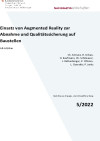
Ziel dieses Forschungsprojektes ist die Entwicklung eines baustellentauglichen Augmented-Reality-(AR)-Systems inklusive eines Remote-Expert-System und eines BIM-Closed-Loop Datenübertragungssystem zur Verbesserung der Bauqualität, Gebäudesicherheit und Energieeffizienz sowie zur Effizienzsteigerung im Baucontrolling.
Schriftenreihe
5/2022
Ch. Schranz, H. Urban, H. Kaufmann, Ch. Schönauer, J. Rattenberger, P. O’Brien, L. Ozeraitis, P. Jaritz
Deutsch, 62 Seiten
Downloads zur Publikation
Sondierung des wesentlichen F&E-Bedarfs zur Optimierung von städtischen Energiespeichern in integrierten Energiesystemen (CityStore)
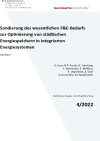
In CityStore wird erstmals ein innovativer Ansatz zur räumlichen Verortung von Speicherbedarf und -potentialen verfolgt. Dies inkludiert die Evaluierung der konkreten Herausforderungen und Voraussetzungen sowie die Identifikation von sinnvollen Speichertechnologien und -kapazitäten. Dazu werden Modellrechnungen für die Vorzeigestädte Graz und Weiz durchgeführt und die Verallgemeinerungsfähigkeit der Ergebnisse anhand der Follower-Region Südburgenland untersucht. Die Resultate sollen optimierte Planung und Realisierung von städtischen Energiespeichern ermöglichen – wodurch zielgerichtet in Energieinfrastruktur zur Umsetzung von (lokalen) Klima- und Energiezielen investiert werden kann.
Schriftenreihe
4/2022
D. Suna, N.P. García, G. Totschnig, S. Wimmeder, E. Meißner, R. Ungerböck, A. Graf, A. Dornhofer, M. Niederkofler
Herausgeber: BMK
Deutsch, 153 Seiten
Downloads zur Publikation
Gamification als Möglichkeit für die Generierung von Daten zur energieorientierten Quartiersplanung (HotCity)
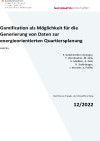
Ziel des Projekts war ein Funktionstest, ob durch Gamification kosteneffizient, rasch und zuverlässig ein aktueller Datensatz von energierelevanten Daten zur Quartiersplanung erhoben werden kann. Dies wurde am Beispiel der Potenzialermittlung von industriellen und gewerblichen Abwärmequellen in Wien und Graz ermittelt.
Schriftenreihe
12/2022
E. Gebetsroither-Geringer, T. Wernbacher, M. Göls, E. Meißner, A. Graf, R. Stollnberger, J. Worster, A. Peiffer
Herausgeber: BMK
Deutsch, 157 Seiten
Downloads zur Publikation
RENEWnow - Neue Impulse für die hocheffiziente energetische Sanierung von Geschoßwohnbauten und Quartieren
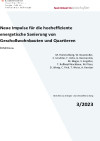
Sondierung eines innovativen Lösungsansatzes für die hocheffiziente Sanierung von Mehrfamilienhäusern in Österreich. Das Ziel ist durch einen gezielten, neuartigen Mix aus technischen und nichttechnischen Maßnahmen ein neues Dienstleistungsmodell (One-Stop-Shop) für Hausverwaltungen und Eigentümergemeinschaften zu entwickeln.
Schriftenreihe
3/2023
M. Hommelberg, W. Nussmüller, C. Urschler, F. Ochs, G. Dermentzis, M. Magni, V. Engstler, T. Roßkopf-Nachbaur, M. Ploss, D. Jähnig, C. Fink, T. Weiss, A. Knotzer
Herausgeber: BMK
Deutsch, 127 Seiten
Downloads zur Publikation
INN'FIT4UM - Innsbruck "Fit4UrbanMission" - klimaneutrales Innsbruck 2030
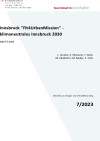
Ziel in INN’F4UM ist es, aufbauend auf einer aktuellen Darstellung der Energie- und Ressourcenflüsse gemeinsam mit der Universität Innsbruck einen Stufenplan zur Erreichung der Klimaneutralität der Stadt bis 2030 zu entwickeln.
Schriftenreihe
7/2023
L. Jänicke, K. Kleewein, Y. Back, M. Kleidorfer, M. Mailer, F. Ochs
Herausgeber: BMK
Deutsch, 39 Seiten
Downloads zur Publikation
Simultane Planungsumgebung für Gebäudecluster in resilienten, ressourcen- und höchst energieeffizienten Stadtteilen (SIMULTAN)
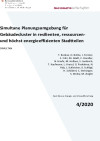
Es soll die Möglichkeit zur Steigerung der Effizienz gebäudeübergreifender Energiesysteme geschaffen werden um dem Ziel resilienter Städte und Stadtteile mit hoher Lebensqualität, Ressourcen- und Energieeffizienz nahe zu kommen. Ziel war ein auf simultaner technischer Planung basierendes praxistaugliches Werkzeug zur Entscheidungsunterstützung bei Sanierungs- und Neubauplanungen (bis zu Plusenergiegebäuden) in hocheffizienten Stadtteilen.
Schriftenreihe
4/2020
T. Bednar, D. Bothe, J. Forster, S. Fritz, M. Gladt, C. Handler, N. Haufe, M. Hollaus, S. Jambrich, T. Kaufmann, L. Kranzl, G. Paskaleva, N. Rab, J. Schleicher, K. Schlögl, H. Schöberl, C. Steininger, S. Wolny, M. Ziegler
Herausgeber: BMK
Deutsch, 208 Seiten
Downloads zur Publikation
Energieoptimierte Design-Regeln und Planungsschnittstellen für bauwerkintegrierte Photovoltaik im urbanen Raum (VITALITY)
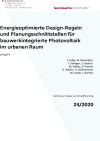
Das Projekt VITALITY zielte darauf ab, unterstützende Instrumente, Designregeln und belastbare Informationen in der frühen Entscheidungs- und Entwurfsphase von Bauvorhaben zu liefern, um bauwerkintegrierte Photovoltaik (BIPV) einerseits in die Diskussion der Konzeptphase einzubringen und andererseits die Umsetzung stark vorzubereiten und zu unterstützen.
Schriftenreihe
24/2020
T. Selke, M. Rennhofer, T. Schlager, S. Sautter, M. Kaftan, A. Preisler G. Becker, O. Stelzhammer M. Lovati, J. Kanters
Deutsch, 57 Seiten
Downloads zur Publikation
FEELings - User Feedback for Energy Efficiency in Buildings
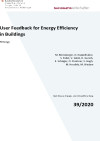
Der Energieverbrauch von Gebäuden wird maßgeblich durch das Verhalten von NutzerInnen beeinflusst. In diesem Forschungsprojekt wird ein neuartiges User-Feedbacksystem untersucht. NutzerInnen geben Feedback zur empfundenen Raumqualität. Auf Basis des Feedbacks werden Einstellungen an der Gebäudetechnik zur Energieeffizienz- und Komfortsteigerung optimiert. Der Proof-of-Concept für dieses neuartige System wird anhand von zwei Use-Cases erbracht.
Schriftenreihe
39/2020
M. Monsberger, D. Koppelhuber, S. Pabst, V. Sabol, H. Gursch, E. Schlager, O. Prentner, S. Singh, M. Herzlieb, M. Wedam
Herausgeber: BMK
Deutsch, 80 Seiten
Downloads zur Publikation
Digitale Transformation für größere Interaktivität in der TGA-Planung (digiaktiv)
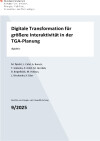
Das Projekt digiaktiv verfolgte, eine Verbesserung der Interoperabilität zwischen den unterschiedlichen Baugewerbegewerken durch neutrale, offene semantische Datenmodelle zu ermöglichen. Dabei trägt digiaktiv mittels digitaler Transformationsprozesse zur Steigerung der Planungsqualität und dem Betrieb von Bauwerken, sowie zur Minimierung des Schnittstellenrisikos bei.
Schriftenreihe
9/2025
M. Šipetić, J. Catal, A. Buruzs, T. Natiesta, P. Hölzl, M. Herzlieb, B. Beigelböck, M. Hollaus, L. Bischanka, K. Eder
Herausgeber: BMK
Deutsch, 62 Seiten
Downloads zur Publikation
LINE-FEED: Plug-in Photovoltaik-Speicher für die Steckdose
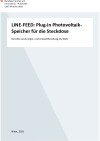
Im Projekt LINE-FEED wurden Technologien entwickelt, die für einen Photovoltaik-Speicher benötigt werden, der von jedem Laien an einer gewöhnlichen Steckdose angeschlossen werden kann. Ziel war die Entwicklung eines Speichersystems für Haushalte in urbanen Räumen, welche selbst keine Möglichkeit der Installation einer Photovoltaikanlage haben.
Schriftenreihe
45/2025
Christoph Grimmer, Patrick Salcher, Stephan Weinberger, Zlatko Bonjic, Klaus Krischan
Herausgeber: BMIMI
Deutsch, 32 Seiten
Downloads zur Publikation
Urbaner Kältebedarf in Österreich 2030/2050 (UKÖ 2030/2050)
Systematische Aufarbeitung des steigenden Kühlbedarfs und Darstellung der geographischen Verortung des Kältebedarfs in Österreich. Das Ergebnis dient als Entscheidungshilfe bei der Entwicklung von Klimaschutzmaßnahmen und Klimawandelanpassungsstrategien sowie eine Abschätzung zum Kältebedarf der Zukunft.
50 grüne Häuser - Entwicklung und Demonstration eines Low-Tech-Grünfassadensystems
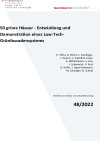
Entwicklung einer kostengünstigen gewerke- und prozessübergreifenden All-In Gebäudebegrünung inkl. Wartungskonzept ("Greening-Toolkit") zur breiten (vor allem straßenseitigen) Implementierung auf Fassaden im städtischen Bestand, kombiniert mit einer Prozessinnovation zur Vereinfachung aller notwendigen Abstimmungsprozesse.
Schriftenreihe
48/2022
U. Pitha, O. Weiss, C. Dantinger, J. Dunzer, C. Kaindl, B. Kainz, A. Mitterhauser, S. Lins, J. Schwanzer, V. Enzi, G. Hofer, S. Jäger-Katzmann, M. Lanzinger, B. Schoas
Herausgeber: BMK
Deutsch, 100 Seiten
Downloads zur Publikation
Sondierung eines Villacher Innovationslabors zur kooperativen Entwicklung von nachhaltigen Quartieren (Villab-Sondierung)
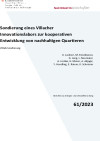
Das Projekt „Villab - Sondierung“ dient der Überprüfung der Machbarkeit eines urbanen Innovationslabors zur Beschleunigung der Transformation Villacher Quartiere in Richtung Klimaneutralität. Die positive Machbarkeit vorausgesetzt, werden die Kooperationen mit relevanten Stakeholdern vertieft und ein Businessplan für ein künftiges Innovationslabor erstellt.
Schriftenreihe
61/2023
U. Lackner, M. Panebianco, G. Lang, L. Neumaier, A. Jordan, H. Moser, A. Alijagic, Y. Hendling, E. Rainer, K. Schreiner
Herausgeber: BMK
Deutsch, 78 Seiten
Downloads zur Publikation
Nationales Green Tech Förderungsupdate
7. Mai 2024, 15:00 - 16:30 Uhr
Online
Das Webinar gibt einen Überblick über aktuelle, österreichweite Förderungsmöglichkeiten für grüne Innovationen von Energie- und Umwelttechnik-Unternehmen.
StadtKlimaVISION - Vorbereitung eines urbanen Innovationslabors für klimaneutrale Stadtplanung: In Linz beginnt’s!
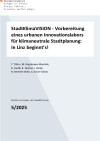
In StadtKlimaVISION wurde ein Innovationslabor für klimaneutrale Stadtplanung in der Stadt Linz konzipiert, mit dem Ziel, Instrumente der Stadtplanung stärker an Klimawandelanpassung und Klimaschutz auszurichten und Interessensgruppen aus Wirtschaft, Wissenschaft und Zivilgesellschaft einzubinden.
Schriftenreihe
5/2025
T. Tötzer, M. Bügelmayer-Blaschek, D. Havlik, B. Skarbal, J. Horak, N. Niemetz-Wahl, A. Geyer-Scholz
Herausgeber: BMK
Deutsch, 66 Seiten
Downloads zur Publikation
Digitale Plus-Energiegemeinschaften (#EEG+)
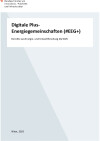
Das Projekt behandelte Aspekte im Zusammenhang zwischen Plus-Energiequartieren und Energiegemeinschaften, welche beide darauf abzielen Gebäude nachhaltiger zu machen. Ziel war es Synergieeffekte zu sondieren und eine mögliche Umsetzung als Demonstration zu erforschen.
Schriftenreihe
48/2025
Stefano Coss, Martin Moser, Georg Wagner, Robert Gödl, Hermann Neuburger, Daniel Bell
Herausgeber: BMIMI
Deutsch, 44 Seiten
Downloads zur Publikation
New European Bauhaus Festival - Side-Event
4. - 5. April 2024
Altaussee, Gemeindesaal
Unter dem Motto „Touristische Baukultur – Motor nachhaltiger Entwicklung“ ging die Veranstaltung der Frage nach, welche Form und „Gesicht“ ein nachhaltiger Tourismus in Zukunft haben könnte. Als Rahmen diente dabei der leitmotivische Dreiklang des Neuen Europäischen Bauhaus - Nachhaltigkeit, Ästhetik und Inklusion.
Marktentwicklung innovativer Energietechnologien – Ergebnisse aus 2023
19. Juni 2024, 10:00 – 14:00 Uhr
BMK, Festsaal (Erdgeschoß), Radetzkystraße 2, 1030 Wien
Am 19. Juni 2024 wurden die Marktzahlen des Jahres 2023 präsentiert. Dabei wurden die Trends und der Status der Marktdurchdringung von erneuerbaren Energie- und Speichertechnologien in Österreich vorgestellt.
cityclimAIte Stakeholder-Workshop: „KI-Anwendungen für klimaneutrale Städte“
6. Mai 2025, 13:00 - 15:30 Uhr
Online
Um die Potenziale von Künstlicher Intelligenz (KI) auch in der Verkehrs- und Stadtplanung, im Energie- oder Abfallmanagement optimal zu nutzen, müssen praxisnahe und bedarfsgerechte Lösungen identifiziert werden. Die Studie cityclimAIte analysiert Projekte, Anwendungsfälle sowie aktuelle Entwicklungen. Die Ergebnisse werden im Workshop vorgestellt und gemeinsam diskutiert.
